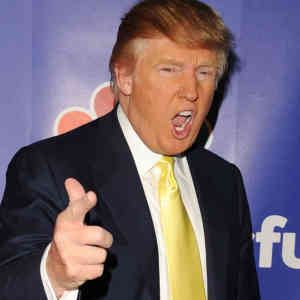Donald Trump sits now where he is most comfortable–at the center of reality. Like sunflowers craning toward the daylight, it seems our body politic is bent toward the billionaire carnival-barker turned politician. This “Trumpotropism” is unsettling to our political class, especially of the genus Republican. The disquiet is deafening.
There is good reason for concern. Trump leads in some polls by double-digit margins, and though early frontrunners frequently flame-out (what happened to the Bachmann-Cain ticket in 2012?), Trump, unlike previous wilting flowers, greets the moon while sleeping on luxurious piles of cash. If he wants to hang around, he will. If he wants to poke the GOP with a sharp stick and run as an independent, he can. Outside of strategic concerns, Trump’s power speaks to our culture and our politics. He has managed, in a way only the blustery and shameless can, to join two streams of discontent.
There is a deep disgust for our governing class. Congress is as popular as the bird flu and nearly as dangerous. Too many “leaders” suffer from skewed priorities. Power, wealth, and celebrity drive them far more than policy or service. Lucrative lobbying careers, speaking fees, book deals, and cable news programs are the real goals in Washington (or Columbus or any other state capital). Politics is a means to unsavory ends and we all know it. Trump, though unsavory himself in myriad ways, doesn’t need the money. He is already famous. For many, these facts alone are enough to conclude he must be doing this for the right reason–to help fix things.
Beyond this, political correctness is the oxygen that fuels our culture. We all contort ourselves daily not to offend. We couch our words and we shield the truth with warm, comfortable phrases. We say “feel,” when we ought to say “think,” and nearly any strong point is blunted with, “but, that is just my opinion.” There are some topics too toxic to touch, so we cordon them off from civil conversations, clutching our own yellow tape of doom–“Politically Incorrect Line–Do Not Cross.” Donald Trump is a walking trigger warning. His hair is a micro-aggression all on its own. Though sometimes repellant, Trump has a whiff of honesty that many find more aromatic than freshly baked bread.
For the politically learned, Trump’s ribaldry is off-putting. They “tut-tut” at his manners and snicker at his obvious deficiencies. The establishment screams, silently so far, “Heavens, this cannot be! Surely we cannot allow such a man onto the grandest of stages! He is, after all, a reality tv star!” As a theoretical matter, the establishment is correct, but this criticism fails the test of reality. Like it or not, the establishment created Trump’s allure through its failures and its willingness to use tv for its own benefit.
Politicians, establishment and others, long ago made their deal with the television devil. Wearing rabbit ears instead of horns, tv–the celebrity’s most powerful tool–lured politicians with a song too sweet to resist. The instant connection to voters, and the temptation to at least appear “normal” if not “cool,” seduced our political class from top to bottom. Richard Nixon, who, to put it kindly, sometimes struggled to construct a pleasing image, took the plunge on the hit comedy show Laugh-In. Just two months before the 1968 presidential election, candidate Nixon agreed to appear and utter one of the show’s famous tag-lines, “Sock it to me.”
https://youtu.be/8qRZvlZZ0DY
Harmless? Perhaps. Just a tool to reach voters? Yes. But at what cost? Bill Clinton played the saxophone (with sunglasses) on the Arsenio Hall Show. Candidate Sarah Palin did a rap on Saturday Night Live. George W. Bush read a Top Ten list for David Letterman. Rudy Giuliani, as mayor of New York, hosted Saturday Night Live–and, admittedly, it was pretty funny.
President Obama has perfected the use of celebrity to empower himself. While President, he did a “slow jam” of the news with Jimmy Fallon on the Tonight Show. He has routinely picked NCAA tournament brackets on ESPN. The President has been a frequent guest of John Stewart on The Daily Show. The president has gone out of his way to cultivate celebrity relationships, ranging from athletes to singers and actors. Perhaps at his lowest point, President Obama went on a Miami radio show called “Pimp with the Limp” when he campaigned for re-election in 2012.
To dodge such attacks, politicians respond that this is part of communicating with voters today. After all, you ought to drop your line where the fish are biting. At one level, this makes complete sense. It is hard to imagine a modern president that avoids television and the entertainment media since they are integral for many Americans.
But to play this game, as establishment politicians have for more than a generation, and then to decry Donald Trump as a buffoon, seems more convenient than convincing. It is a thin, and slowly disappearing, line that separates the “serious” candidates using the medium to reach people from a product of the medium running for our highest office. For voters, what, precisely, is the difference between a President pretending to be a celebrity and a celebrity pretending to be President? I think the differences are obvious, but then again, I don’t worship at celebrity’s altar as so many in our culture do.
So, the next time you hear an establishment type decry Trump, be sure to ask him if he is willing to elevate the presidency above the puffery that passes for politics. Then, listen for the crickets, that is, if you can hear them over the tv.

 Bert Wheeler
Bert Wheeler
 Jeff Haymond
Jeff Haymond
 Marc Clauson
Marc Clauson
 Mark Caleb Smith
Mark Caleb Smith
 Tom Mach
Tom Mach